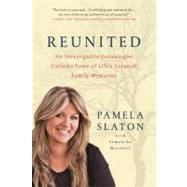
Praise for Reunited:
“Pam has created a wonderful and gripping collection of heartfelt stories - bringing you along as she reunites people separated in life by adoption or other circumstances. Finding my birth mother was life changing in so many ways – Pam and her life's work will inspire everyone to reach for the truth.” – Cathy Konrad, Golden Globe Award-winning Producer (Walk the Line)
“Reunited is a powerful, page-turning account of Pam’s incredible work …. With Pam on your side the door can open, the secrets dissolve. I can't imagine my life without ever knowing the truth of my birth situation. No one starts a book on chapter two – Pam helped me have my chapter one, and for that I am eternally grateful.” – Sheila Jaffe, Emmy-award-winning casting director (The Sopranos)
The New copy of this book will include any supplemental materials advertised. Please check the title of the book to determine if it should include any access cards, study guides, lab manuals, CDs, etc.
The Used, Rental and eBook copies of this book are not guaranteed to include any supplemental materials. Typically, only the book itself is included. This is true even if the title states it includes any access cards, study guides, lab manuals, CDs, etc.